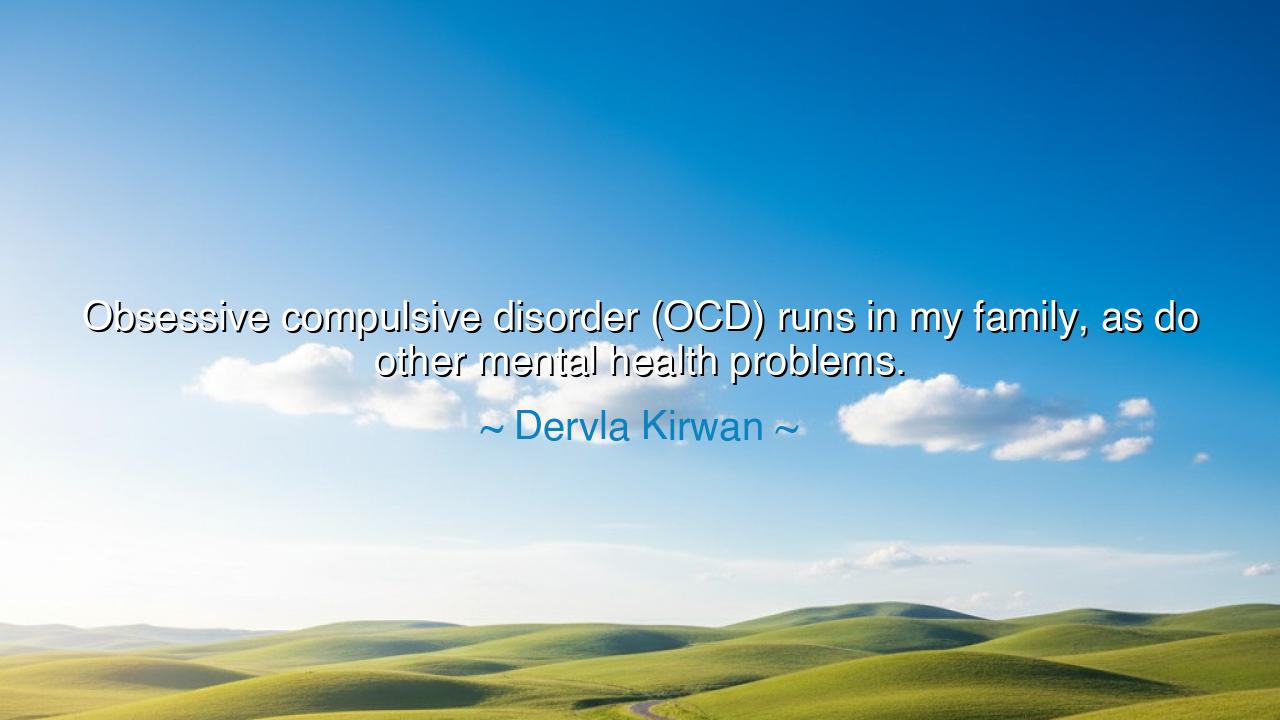
Obsessive compulsive disorder (OCD) runs in my family, as do
Obsessive compulsive disorder (OCD) runs in my family, as do other mental health problems.






The Inheritance of Shadows
Hear now the quiet and courageous words of Dervla Kirwan, the actress who gazed inward and spoke with honesty rather than shame: “Obsessive compulsive disorder (OCD) runs in my family, as do other mental health problems.” These words, though simple, carry the weight of generations. They are not a confession of weakness but a declaration of truth—and truth, though often painful, is the first step toward freedom. For in her words lies a profound recognition: that the mind, like the body, carries the legacy of those who came before, and that the struggles we inherit are not curses, but burdens that call for compassion and understanding.
The Meaning of the Teaching
To say that something “runs in the family” is to acknowledge the ancient river of inheritance—the flow of blood, memory, and pattern that connects the living to the dead. Dervla Kirwan speaks of OCD and mental health problems not as isolated storms, but as echoes that pass from ancestor to descendant. Her words remind us that illness of the mind is not a mark of failure, nor a flaw in character, but a thread in the fabric of human experience. Just as one might inherit the color of one’s eyes, so too might one inherit the tremors of anxiety or the cycles of compulsion. And yet, she speaks without despair—for within awareness lies the power to heal the lineage.
The Origin of the Words
Dervla Kirwan, known for her artistry on stage and screen, has often been praised for her emotional depth—a depth carved not only by craft, but by lived experience. When she spoke these words, she broke a silence that has haunted many families: the silence around mental health. For centuries, the unseen wounds of the mind were met with fear or denial. But her declaration is an act of courage—a torch lifted high to light the shadows that once hid generations of pain. In naming what runs through her bloodline, she transforms secrecy into strength, and stigma into solidarity.
The Tale of Vincent van Gogh
In the story of the world’s great creators, there is none more poignant than Vincent van Gogh, the painter whose genius was both a gift and a torment. He too was a child of a family where mental illness ran like a deep and restless current. His suffering was profound, yet from that suffering bloomed art that revealed the beauty within chaos—the stars that swirl above madness. Van Gogh did not escape his inheritance, but through his art he gave meaning to it, turning pain into creation and anguish into light. His life teaches us, as does Dervla’s truth, that even the wounds we inherit can become sources of understanding, empathy, and art.
The Burden and the Blessing
The ancients taught that each soul is born into a web of fate, woven long before its birth. Within that web lie both gifts and trials. Some inherit strength of body, others endurance of spirit; some inherit tempests of the mind. But every inheritance, whether bright or dark, carries within it a lesson to be learned. To deny it is to repeat it. To confront it is to transform it. Dervla’s words call us to this ancient work—to see our family’s struggles not as chains, but as challenges that, when met with compassion, can turn generational sorrow into generational wisdom.
The Courage to Speak
To speak openly of mental illness is to rebel against centuries of silence. Many fear that such honesty will bring judgment, but in truth, it brings healing. For the moment one voice rises to name the invisible, others find the courage to join it. In families and communities, the act of speaking—of naming what runs beneath—becomes the medicine of connection. It says, “You are not alone. This struggle does not define your worth. Together we can understand, and together we can heal.” Such words are not only brave; they are sacred.
The Lesson for the Generations
Therefore, O listener, take heed of this wisdom: do not hide the wounds of the mind, for what is hidden festers, but what is brought to light begins to mend. If you bear an inherited sorrow, face it with grace. Seek knowledge, seek support, seek compassion. The courage of one can redeem the silence of many. In families where pain once ruled unspoken, let truth now dwell instead. Let understanding replace judgment, and kindness take root where fear once grew. For the health of the mind is not an individual’s burden alone—it is a collective calling.
The Eternal Call
So let Dervla Kirwan’s words echo through the ages: “Obsessive compulsive disorder runs in my family, as do other mental health problems.” May her honesty remind us that we are all bound by the same fragile humanity, that the mind’s struggles are as real as the body’s, and that to speak them aloud is to begin their healing. Let each generation listen, learn, and love more deeply than the one before. For when truth flows freely through a family, the river of inheritance becomes not a curse, but a current of understanding, courage, and renewal.






AAdministratorAdministrator
Welcome, honored guests. Please leave a comment, we will respond soon